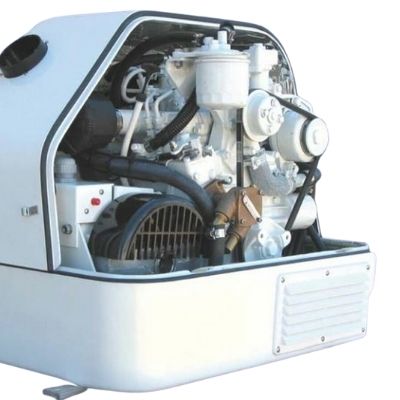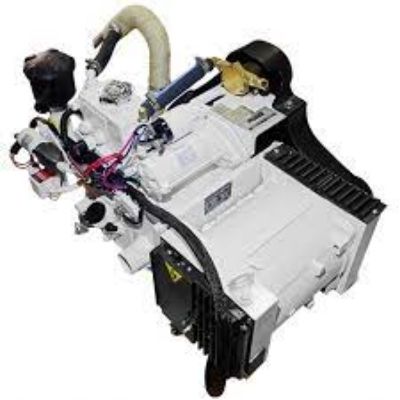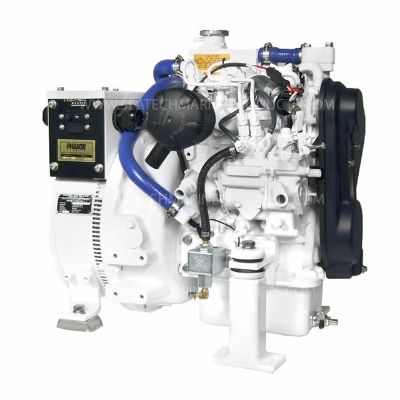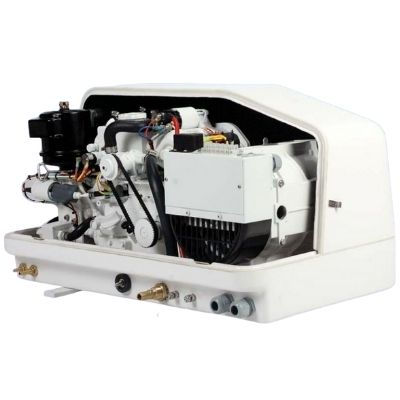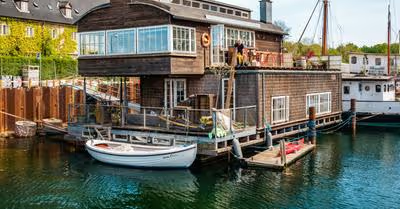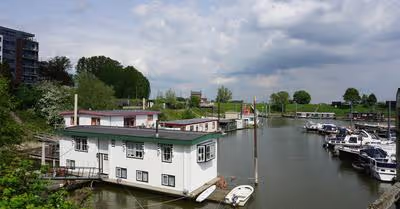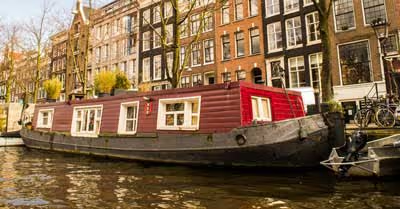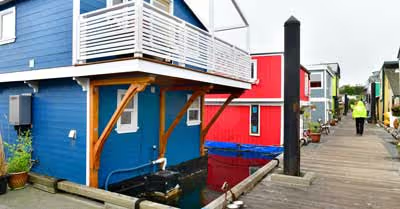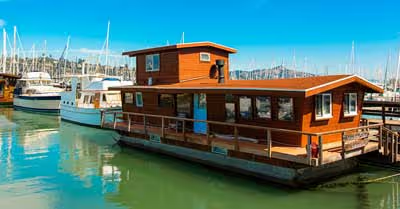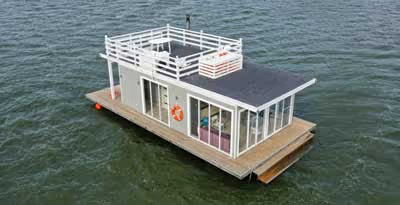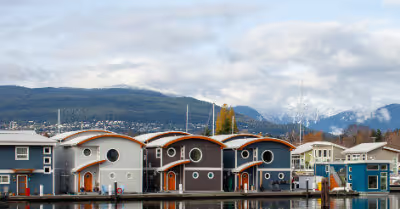
Houseboats can save fuel and money by using a generator instead of the main engine for power. But which marine generators are the best?
The best houseboat generators are the NextGen UCM2-5.5 Ultra-Compact 5.5 kW Diesel, the Phasor LP1 Diesel 3.5 kW Low-Profile Marine, the Phasor Marine Permanent Magnet 4.5 kW Diesel, and the NextGen UCM1-3.5 Diesel 3.5 kW Ultra-Compact Marine.
In this article, we’ll go over everything you need to know about houseboat generators, including the most common types and generator fuels. Additionally, we’ll review four of the best and most popular houseboat generators. We’ll also explain wattage output and how to choose the best generator for your houseboat.
We sourced generator technical specifications directly from the manufacturers to ensure accuracy.
Types of Houseboat Generators
Houseboat generators are not one specific type of generator. Different houseboats have different levels of power consumption, different amounts of storage space, and different systems—thus, there are many kinds of generators used aboard houseboats. Here are the most common types.
Gasoline Houseboat Generators
Gasoline-powered houseboat generators are usually the lightest and most compact. Gasoline engines are simple and extremely reliable, though less efficient than diesel engines. Gasoline generators are also inexpensive and easy to start. Most small houseboats use gasoline generators, especially if they’re only used intermittently.
Diesel Houseboat Generators
Diesel houseboat generators are used in heavier applications. Diesel generators, while larger and more complex than gasoline generators, but they’re extremely efficient, and they last a very long time.
Almost all large houseboats are equipped with diesel generators, especially if diesel is their primary propulsion fuel. Diesel generators are ideal for sustained use, as they can run at a stable RPM for extended periods of time.
Portable Houseboat Generators
Portable houseboat generators are an option, though they have a few notable disadvantages and thus aren’t common. Portable generators can’t be stored inside the houseboat and are typically only used as backups. Almost all portable generators are powered by gasoline.
Marine Generator Vs Conventional Generator
A marine generator is designed specifically for use aboard boats. Generally, these generators have wet exhaust and are cooled using the water from around the boat. This is more convenient than closed-loop systems that require a radiator and coolant, and there’s no need for a cooling fan.
Marine generators are designed to work with special fuel filters that separate water and other contaminants out of the fuel. Using any kind of generator without the proper fuel filtration will almost invariably cause problems down the road.
Houseboat Generator Capacity
Electricity can be confusing, as it’s not intuitive like horsepower or fuel economy ratings. Here, we’ll clear up some of the generator rating and output information so you can choose the right size.
Generator Wattage
Usually, the output of a generator is measured in watts. A watt is a unit used to measure power, and most appliances also have a wattage or maximum wattage rating. For example, a 100-watt generator could power one 100-watt light bulb or two 50-watt light bulbs.
Larger generators usually measure output in kilowatts or kW. A kilowatt is simply a thousand watts. For example, a 10,000-watt generator could also be labeled 10 kW, and a 25,000-watt generator probably will be labeled 25 kW.
The average size of a houseboat generator is between 2,000 and 10,000 watts, or 2 kW and 10 kW. The smallest inboard generators are usually around 1,500 watts or 1.5 kW.
Typically, the electrical switch panel will tell you how much power your houseboat draws. If the vessel is all original, the spec sheet may also give you the maximum power draw.
This is a great way to figure out what kind of generator you need. If you use a smaller generator, you can compensate by cutting out wattage. Switching to LED light bulbs can help, and using appliances sparingly can too. For example, don’t run the AC and the stove at the same time.
Best Generators for Houseboats
The best generators for houseboats are true marine generators that can be automatically started and regulated. Most newer houseboats have power systems that are designed to work with generators. Here are four of the best generators for houseboats.
1. NextGen UCM2-5.5 Ultra-Compact 5.5 kW Diesel Generator
Picture of the NextGen UCM2-5.5 Ultra-Compact 5.5 kW Diesel Generator
The NextGen UMC2-5.5 is part of a new generation of marine generators that give you the efficiency, reliability, and longevity of a diesel engine in a compact package. This diesel unit is completely self-contained within an enclosure and only needs external hookups for water cooling.
The NextGen UMC2-5.5 is a marine generator, which means it’s specifically designed for use on boats. The containment keeps water and other gunk out but also keeps odors, gasses, and unpleasant engine noise in. This is particularly important on houseboats, which should be comfortable and quiet even when the engine is running.
Additionally, the NextGen UMC2-5.5 generator is highly efficient. It’s a Diesel engine that produces roughly 11 horsepower at 2800 RPM, which reduces noise and increases efficiency. It has a 23:1 compression ratio, which is more than double a traditional gas engine. Additionally, this two-cylinder diesel runs at low RPMs, which increases service life.
The NextGen UMC2-5.5 produces 5.5 kW of electricity or 5,500 watts. This makes it ideal for a medium-sized houseboat, and it’s enough to run your lights and an air conditioner at the same time. The engine features an electric Bosch fuel system and a cooling water system that’s designed for use with freshwater.
Best Uses:
The NextGen UMC2-5.5 compact diesel generator is perfect for a typical or medium-sized houseboat when efficiency and quiet operation are key.
2. Phasor LP1 Diesel 3.5 kW Low-Profile Marine Generator
Picture of the Phasor LP1 Diesel 3.5 kW Low-Profile Marine Generator
The Phasor LP1 is an ultra-compact diesel generator that produces 3.5 kW of electricity. It’s designed to be low-profile and to fit in compact spaces under the floor or in a hatch of a boat. It’s completely self-contained and spread out instead of stacked.
This low-profile generator weighs just 185 pounds, which is extraordinarily light for an inboard diesel generator. It has a 3,500-watt output at 120 or 240 volts and 30 or 25 amps. The engine is designed to operate at 2,800 RPM, which is quieter than the standard 3,600 rpm for other diesel generators. Additionally, this lower standard operating speed will make the engine last longer and burn less fuel.
The engine itself is made by Kubota, which has a long history of manufacturing reliable and long-lasting compact diesel tractors. It’s a single-cylinder engine that displaces just 19 cubic inches but produces enough reliable power to be used as a primary generating unit.
This Kubota-based generator is water-cooled and designed to be connected to an intake pipe and screen on the bottom or side of the boat. As long as it gets enough water for cooling, it will run forever. The unit is designed to be integrated into gauges and an automatic power system, and it’s also compatible with older houseboats.
Best Uses:
The Phasor LP1 compact diesel generator is ideal for houseboats that have limited space or need to store the generator under the floor.
3. Phasor Marine Permanent Magnet 4.5 kW Diesel Generator
Picture of the Phasor Marine Permanent Magnet 4.5 kW Diesel Generator
Here’s a mid-size marine generator that’s an excellent option for medium to large houseboats. This Phasor Marine permanent magnet generator produces 4.5 kW of power, or 4,500 watts, using a two-cylinder Diesel engine and a permanent magnet motor. This generator is one of the most popular generating units for medium to large houseboats, and it’s suitable for boats between 25 to 50 feet in length.
The engine itself is a Kubota diesel, which is known for its exemplary reliability and long life expectancy. Additionally, this two-cylinder diesel has an excellent efficiency rating, and it has been proven over many years in all kinds of boats.
This Phasor Marine getset unit is completely self-contained and only needs to be hooked up to a controller, fuel tank, and cooling lines. This means that you can install this generator in virtually any boat, regardless of the age and configuration. If it fits, and you connect the necessary equipment, it’ll work.
This generator features automatic start, automatic RPM control, and it hooks up to standard marine engine monitoring gauges. Additionally, the unit features a marine air cleaner and an extremely effective silencer, which allows the engine to run quietly even in confined spaces.
Best Uses:
Great all-around diesel generator for medium to large houseboats and a popular and well-tested model.
4. NextGen UCM1-3.5 Diesel 3.5 kW Ultra-Compact Marine Generator
Picture of the NextGen UCM1-3.5 Diesel 3.5 kW Ultra-Compact Marine Generator
The NextGen UMC1-3.5 is a single-cylinder marine diesel generator designed to fit in the most compact spaces. This generator unit features a horizontal water-cooled engine and freshwater heat exchange cooling, which works well on any fresh body of water.
The NextGen unit itself is completely self-contained inside of a baffle box. This box reduces engine noise and prevents gas, engine odors, and mechanical fluids from getting into a space.
Additionally, it also prevents outside weather from getting into the generator equipment. This means it can be mounted outside, such as on the back deck, if no room is available inside.
This generator operates at relatively low RPMs (less than 3000), which increases efficiency and extends the life of the motor. This results in average fuel consumption of just 2/10ths of a gallon per hour, which is remarkably low for a houseboat generator. That translates to an average cost per hour of fewer than 50 cents on average, depending on your local fuel costs.
The ultra-compact generator is laid out in a horizontal configuration, which allows it to fit into shorter spaces. This is beneficial on small houseboats which only have engine space under the floor. Additionally, it’s self-contained, so it can be used under an interior space as long as the exhaust is properly ventilated.
Best Uses:
An ultra-compact marine generator is an ideal unit for small to medium-sized houseboats with limited space.



